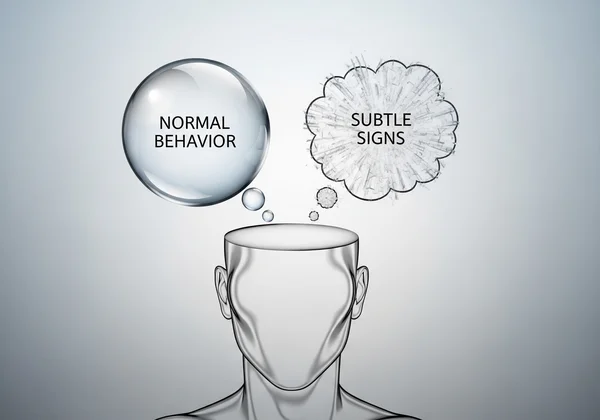轻度精神分裂症症状:早期迹象及何时进行精神分裂症测试
您是否因思维或感知上的细微变化而感到困惑?您并不孤单。许多人会经历早期、不那么严重的症状,这些症状可能令人不安,通常被描述为“轻度精神分裂症”或“衰减性精神病”。这些现实中的悄然变化可能会让您感到孤立,但了解它们是迈出有力第一步的关键。本指南将探讨这些早期迹象,并解释为什么识别它们对于及时寻求有效支持至关重要。
处理这些感受可能令人望而却步。您可能想知道,精神分裂症是如何开始的? 通常,它并非突然发作,而是逐渐偏离您平时的自我。如果您正在寻找一种私密的方式来理解自己的经历,一份保密的 精神分裂症测试 可以提供初步的见解,并帮助您整理思绪。迈出这样初步的一步,对于 获得一些清晰的认识 至关重要。

了解轻度精神分裂症症状
当我们谈论“轻度”症状时,通常指的是病情的最初阶段,精神卫生专业人员称之为前驱期。在此期间,症状往往模糊不清,很容易被误认为是压力、焦虑或青少年常见的情绪波动。然而,它们代表着一个人先前功能水平和经验的显著变化。识别这些变化是早期干预的关键。
什么是早期精神病迹象?
早期精神病 指的是个体首次出现精神病性症状。这些迹象本质上是您感知世界方式的改变。它们不像完全发作期那样强烈或持续,但它们确实存在并引起痛苦。这些衰减的或减弱的症状可能包括:
- 细微的感知变化: 声音可能比平时更响亮或更轻柔。颜色可能显得更鲜艳或更暗淡。您可能会瞬间看到眼角有阴影,或者以为听到有人低声呼唤您的名字。
- 新的或不寻常的信念: 您可能会对他人产生日益增长的怀疑,这感觉不符合平时的自己。这些想法尚未构成妄想,但它们是持续且令人困扰的,例如感觉别人在监视您或议论您。
- 注意力难以集中: 跟上对话、阅读书籍或完成学校或工作任务可能变得越来越困难。您的思绪可能感到混乱或迟缓。
精神分裂症前驱期如何表现?
前驱期 是首次明确的精神病发作之前的一段时间。它的特点是功能受损和细微症状的出现。这个阶段可能持续数周、数月甚至数年。了解其表现形式对个人及其亲人来说都至关重要。
常见表现包括:
- 社交退缩: 一个人可能开始孤立自己,花更多时间独处,并避免与朋友和家人接触。
- 功能下降: 成绩可能下降,或工作表现可能无故变差。
- 忽视自我护理: 个人卫生和外表可能出现明显下降。
- 情绪变化: 情绪可能显得平淡,或者此人可能反应不当,例如在听到悲伤消息时发笑。他们的情绪反应可能感到麻木或脱节。
如果这些变化听起来很熟悉,无论是在您自己身上还是在您所爱的人身上,一个 在线自我评估 都可以作为一种有益且无压力的探索方式。

识别衰减性精神病综合征
衰减性精神病综合征 是描述轻度精神病性症状体验的临床术语。它正式承认这些早期、不那么强烈的经历是重要的,需要引起重视。这些症状是“衰减的”,意味着它们不够严重或不够频繁,不足以达到全面精神病性障碍的诊断标准,但它们仍然导致显著的痛苦或功能障碍。
识别这种综合征至关重要,因为它能识别出有发展成更严重疾病高风险的个体。它提供了一个早期干预的机会窗口,可以显著改善长期预后。关键在于将这些症状视为需要引起重视的潜在健康信号,而非个人缺陷。
区分细微迹象与正常行为
偶尔感到怀疑、产生奇怪的想法或难以集中注意力是完全正常的。那么,如何区分糟糕的一天和潜在的警示信号呢?关键在于寻找一种持续且与平时的自己不同的变化模式。
问问自己以下问题:
- 这对我或我所爱的人来说是一种新体验吗?
- 这些感受或行为是否随着时间的推移变得更频繁或更强烈?
- 这些变化是否引起了显著的痛苦、焦虑或恐惧?
- 这是否影响了人际关系、学业或工作?
与其专注于单一事件,不如开始 记录心理健康变化 会更有帮助。这可以提供一个更清晰的情况。一个 初步筛查工具 可以通过提供一套结构化的问题来帮助完成这一过程。

前驱期的常见经历
为了更具体地说明这一点,以下是人们在这一早期阶段描述其经历的一些常见方式。他们经常报告说,事情感觉“不对劲”,但又难以解释。
- 感知异常: “世界感觉像隔着一层玻璃。它似乎不太真实。”
- 认知困难: “我说话说到一半就卡壳了。感觉我的大脑一片空白。”
- 多疑或猜疑: “我感觉公交车上的人都在盯着我,我确定他们在议论我。”
- 情感淡漠: “我知道我应该为此感到悲伤,但我什么也感觉不到。”
如果这些经历与您产生共鸣,这表明您的担忧是合理的。进一步探索它们是勇敢而重要的一步。
精神分裂症早期干预的重要性
识别这些轻度或早期症状并非为了引起恐慌;而是为了赋权。研究一致表明,早期干预能带来更好的结果。当症状在变得严重之前得到处理时,更容易管理它们并减少其对个人生活的影响。早期行动有助于维护人际关系、职业发展和整体幸福感。
为何早期发现对预后至关重要
早期发现和干预可以显著改变病程。它能使疾病不那么严重,降低住院的可能性,并支持更快、更彻底的康复。通过及早寻求帮助,您正在掌控并积极致力于 改善您的心理健康。它将重点从危机管理转向主动护理,从而在危机发生前建立应对策略和支持系统。
何时寻求专业的精神分裂症评估
如果您或您关心的人正在经历思想、感受或行为上持续且令人痛苦的变化,是时候咨询专业人士了。您不需要确定发生了什么。专业评估 的目的是获得清晰的认识和专家指导。
如果症状出现以下情况,请考虑寻求帮助:
- 给您或您所爱的人带来显著的情绪痛苦。
- 干扰日常生活,例如工作、学业或人际关系。
- 变得更频繁或更强烈。
从免费且保密的 精神分裂症评估 开始,是您在与医生交谈前整理思绪的绝佳方式。
迈出第一步:免费在线精神分裂症测试
对与人交谈感到不确定是完全可以理解的。这就是为什么 免费在线精神分裂症测试 会是如此有价值的第一步。它提供了一个私密、可访问的空间,让您在没有评判的情况下探索自己的经历。它是一个旨在提供初步见解的工具,帮助您决定下一步行动。
我们的平台秉承为任何有顾虑的人提供安全、保密和支持性资源的原则。
我们的自我评估工具如何帮助识别风险
我们的自我评估基于前驱期问卷,这是一个经过科学验证的工具,用于筛查早期精神病症状。它不是一个诊断工具,而是一种 识别风险信号 的方法。这些问题将引导您了解与前驱期相关的常见经历。
通过回答问题,您可以:
- 以结构化的方式整理您的想法和经历。
- 更清楚地了解您的症状是否与早期风险因素相符。
- 获得一份总结,您可以将其作为与医疗专业人士对话的起点。
您准备好了解它能为您提供哪些见解?立即 进行免费测试。

初步筛查的预期结果
当您使用我们的工具时,您的隐私至关重要。整个过程完全匿名。完成 21 个问题的调查后,您将立即收到一份结果摘要。此摘要旨在为您提供关于您的症状可能引起的痛苦程度的初步反馈。
请务必记住,这只是一个筛查,而不是 临床评估。正式诊断只能由合格的医疗专业人员(如精神科医生或心理学家)做出。我们的目标是为您赋能,让您能够自信地迈出下一步。获取您的初步结果,并用它们来指导您的健康之旅。
下一步:您的清晰与支持之旅
识别轻度精神分裂症症状是理解和管理您心理健康的第一步,也是最有力的一步。这些早期迹象并非对您品格的评判,而是来自您心灵的信号,值得关怀和关注。通过了解前驱期和衰减性精神病,您已经从不确定走向了赋权。
请记住,您不必独自面对这一切。寻求清晰的旅程始于一步。我们鼓励您使用我们保密、免费的资源来探索您的经历。
今天就掌控您的心理健康之旅吧。在我们的主页上 开始您的保密测试,以获得宝贵的初步见解。您的健康值得您为此付出。
关于早期精神分裂症的常见问题
精神分裂症是如何开始的?
精神分裂症通常始于一个“前驱期”,在此期间,行为、思想和情绪会出现细微变化。这可能包括社交退缩、学业或工作表现下降以及轻微的感知异常。这些早期迹象通常模糊不清,可能在首次明确的精神病发作前数月甚至数年出现。
我如何判断自己是否患有精神分裂症?
只有合格的精神卫生专业人员,如精神科医生,在进行全面评估后才能诊断精神分裂症。自我诊断可能具有误导性并带来压力。但是,如果您感到担忧,使用像我们的 在线精神分裂症测试 这样的保密筛查工具可以作为整理思绪并查看您的经历是否与已知风险因素相符的第一步,然后再与医生交谈。
哪些测试可以确诊精神分裂症?
没有单一的血液测试或脑部扫描可以明确确诊精神分裂症。诊断是通过全面的精神科评估进行的,包括观察患者的行为、讨论他们的经历以及详细了解个人和家族病史。医生可能会要求进行实验室检查或影像学扫描,但其主要目的是排除其他可能导致类似症状的医学状况(如脑肿瘤或甲状腺问题)。